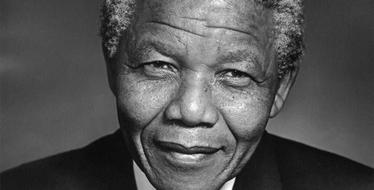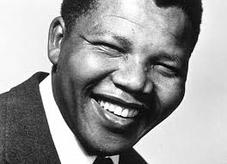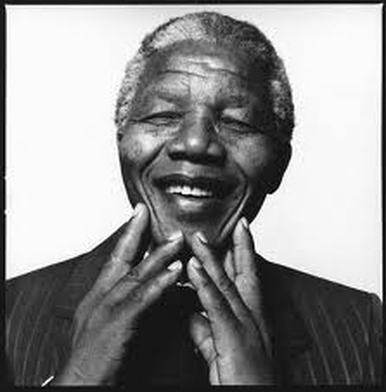
However, there are world figures who touch us no matter how far the distance or political barriers; figures of immeasurable profoundness who do not just shape events but affect us to our very soul. Churchill may have emboldened Britain to withstand the onslaught of Hitler and encouraged Franklin D. Roosevelt to participate in "the Great Crusade" but wartime strategies and simple politics do not move the spirit.
Then, and all too infrequently, there comes a person of such depth and dignity, power and passion, honor and humility, that the world must pause at his or her passing. Persons who make us see the world and, more importantly, ourselves different than we ever could have before. I have seen two such people in my lifetime: Martin Luther King, Jr. and Nelson Mandela.
The resistance against apartheid in South Africa and the Civil Rights movement in the United States were related struggles and each had a profound effect upon the other. Martin Luther King’s phrase “Let freedom ring” was reiterated by Mandela in his speech upon his release from prison. It is not simply a black vs. white issue. It is not simply an African or an American problem. It is part of the struggle for freedom everywhere. Mandela and King both proclaimed that it is equality before the law that must be achieved because in an oppressive system it is both oppressed and oppressor who are belittled. In Mandela’s words, “When one man has his boot on the neck of another, both are suffering.”
Nelson Mandela was not perfect and he declared as much. “I am not a saint, unless you think of a saint as a sinner who keeps trying.” Yes, he had flirted with communism in the 1950’s and found it inadequate for South Africa’s needs. Yes, he had started to embrace armed conflict in the late 1950’s. He had his hatreds but “hatred clouds the judgment” and he was able to look beyond it. No, he was not perfect but he was on a path of perfection. That path had its starting point in prison then on the Robben Island facility off the coast of Cape Town, South Africa. He was determined to maintain his dignity in the face of inhumanity and he began to understand himself. He made peace with his jailer and his warden and turned his enemies into friends.
He achieved the most difficult of all things: to love one’s enemies. He managed that by learning about his own weaknesses and hatreds. When he looked into his own heart, he began to see what was in others’ hearts. Most importantly, he began to desire their freedom as much as his own. The world feared what would happen if the white minority lost control of the government. William F. Buckley, Jr. of National Review said that civilization would collapse if the whites lost political control. They feared “a river of blood” if the black majority ascended to power.
| | |
Instead of a Reign of Terror, there was the Peace and Reconciliation Commission led by Archbishop Desmond Tutu. It was a bloodless revolution that allowed true equality before the law. Whites were not oppressed and no longer were blacks oppressed.

He was not always a cheerleader for America’s adventures and misadventures. He cheered for the action in Afghanistan, he derided the incursion in Iraq. He was speaking as friends do. It was the same love of friend and enemy that allowed him—even propelled him—to reach out to Castro and Bush, Qadaffi and Clinton. In fact, he had discovered the same truth that Lincoln discovered; “I destroy my enemies by making them my friends.”
Seeing the citizens of the world through the eyes of understanding and love was what brought him humility and that humility brought South Africa peace. No, he was not a saint, at all. He could, however, point out his well-traveled path to humility and wisdom and love and that, surely, must be the road that leads to sainthood. At least he kept trying.

 RSS Feed
RSS Feed
